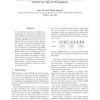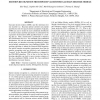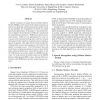84 search results - page 3 / 17 » The subspace Gaussian mixture model - A structured model for... |
CVPR
2005
IEEE
14 years 7 months ago
2005
IEEE
In [1], three popular subspace face recognition methods, PCA, Bayes, and LDA were analyzed under the same framework and an unified subspace analysis was proposed. However, since t...
ICASSP
2011
IEEE
12 years 9 months ago
2011
IEEE
This paper investigates using Gaussian Mixture Model (GMM) based vowel duration features for automated assessment of non-native speech. Two different types of models were compared...
NAACL
2003
13 years 7 months ago
2003
It is well known that frame independence assumption is a fundamental limitation of current HMM based speech recognition systems. By treating each speech frame independently, HMMs ...
ICMCS
2009
IEEE
13 years 3 months ago
2009
IEEE
Gaussian mixture models (GMMs) and the minimum error rate classifier (i.e. Bayesian optimal classifier) are popular and effective tools for speech emotion recognition. Typically, ...
ICPR
2006
IEEE
14 years 6 months ago
2006
IEEE
Speech recognition is usually based on Hidden Markov Models (HMMs), which represent the temporal dynamics of speech very efficiently, and Gaussian mixture models, which do non-opt...




